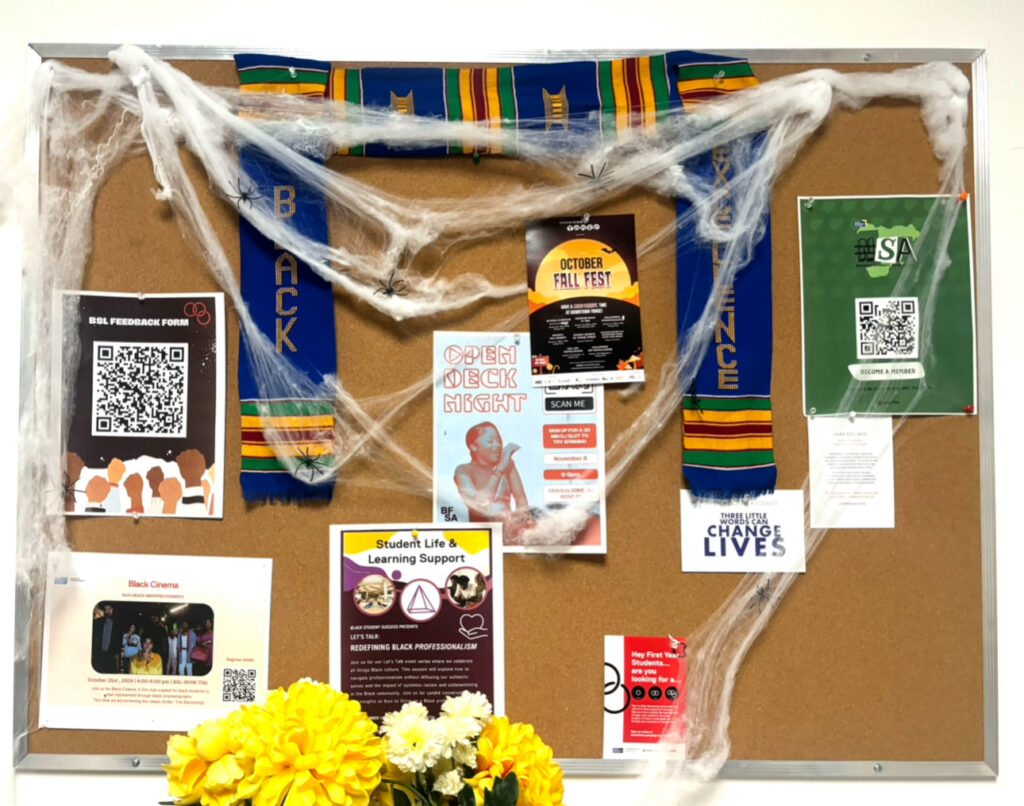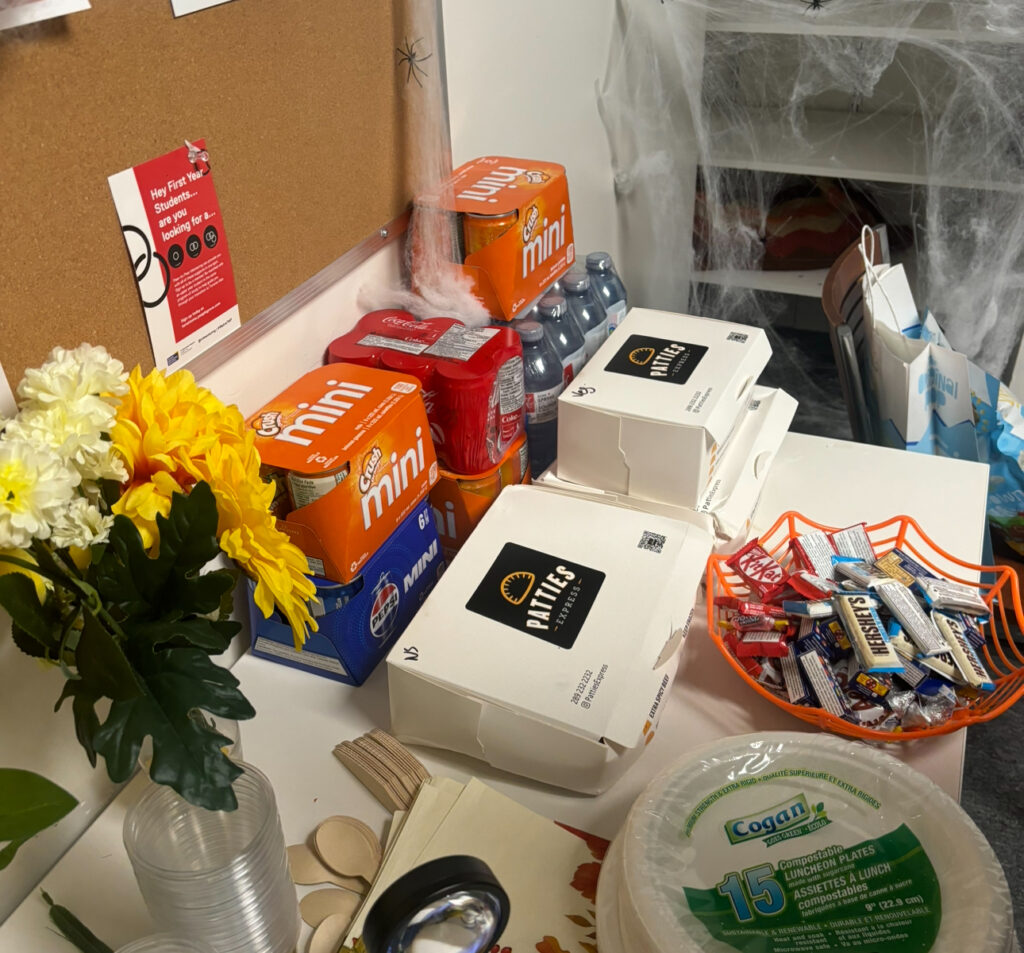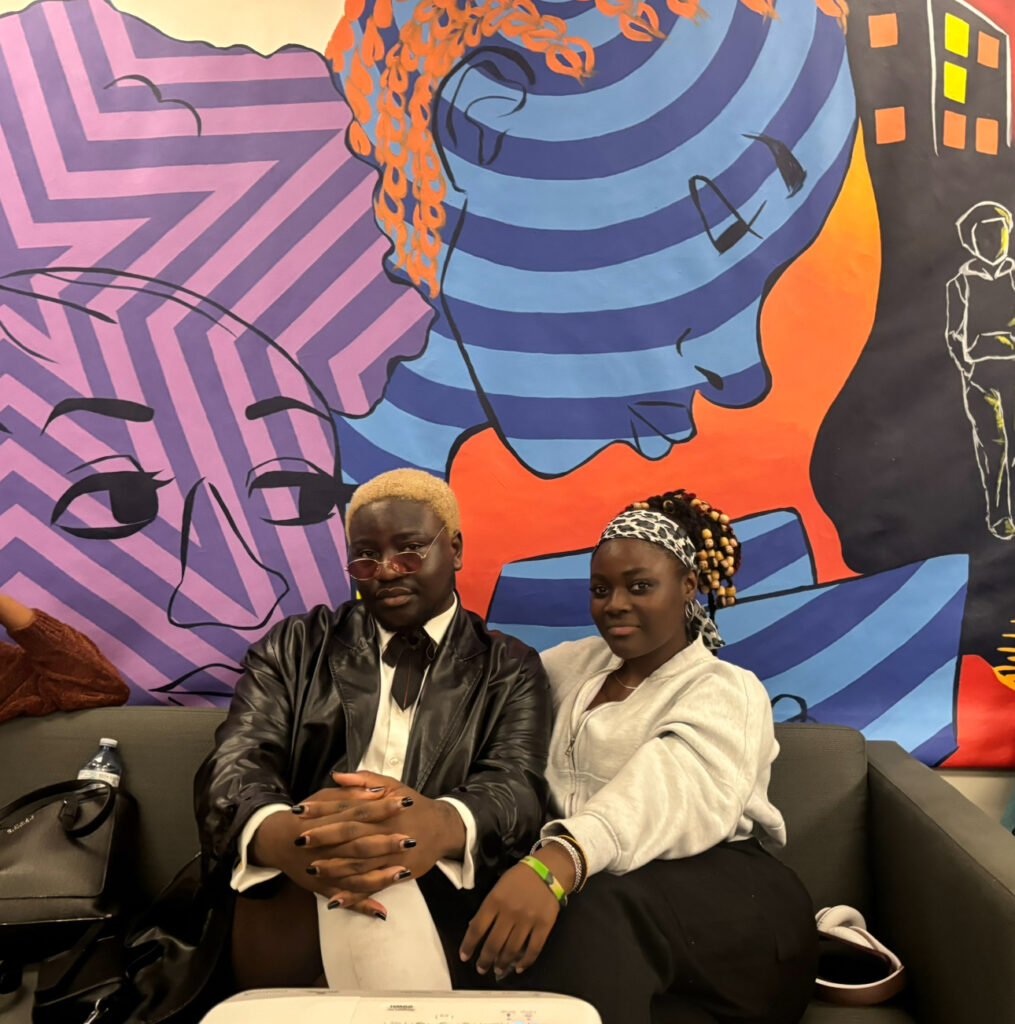
Listen to the whole story here:
To mark the launch of the first Black film club at TMU, organisers held a Halloween-themed screening of the horror-comedy The Blackening on Oct. 31. The film follows seven friends who must rely on their street smarts and horror-movie knowledge to survive a weekend getaway that takes a dark twist. Held in the Black Student Lounge (BSL), the event featured snacks, refreshments, and costumed attendees, adding to the festive Halloween spirit.
“It’s important to bring students together, where we can have a few laughs and have these meaningful discussions around our race,” said co-organiser Shaniqua Browne. Browne is president of the Black Student Association at the Faculty of Community Services’ Student Society, and co-organised the event with Sierra Ogundigie, a Community and Leadership Mentor at TMU. She described the launch of Black Cinema as “revolutionary” for Black students, emphasising that it provides a much-needed space to connect over films that reflect their experiences and identities.
Currently, TMU has only one other film-related club, Toronto Met Fashion & Film, which leans heavily toward fashion-driven initiatives. According to Browne and Ogundigie, Black Cinema, however, fills a unique gap by going beyond entertainment to serve as a platform for discussions on Black representation, lived experiences, and cinematic tropes often overlooked in other campus film spaces. This emphasis on Black community storytelling meets an essential need for Black students who may not find their perspectives fully represented elsewhere.
“We thought about how monumental it might have been to really show representation through Black voices, Black acting, and most of all, just whatever encapsulates Black cinematography,” Browne explained. “Because as we remember, there was a moment of time where you’re watching TV and you’re just hoping that you’ll see someone Black.”
The idea for Black Cinema grew out of the Black Student Support (BSS) team’s mission to empower Black students and faculty, Ogundigie wrote. “Black Cinema was BSS’s way of helping lead and organise ongoing events that bring other Black students together as one, using cinema as the bridge that connects our opinionated differences,” she wrote. “Although we all come from different cultures and backgrounds, we all share the same identity as being Black at TMU.”
She added that keeping the stories of Black directors alive is crucial to building a deeper understanding of Black experiences. While highlighting the symbolic power of cinema, Browne also emphasised that the film club is more than entertainment — it’s a space for dialogue.
“Media is everywhere you turn, especially in this century. There’s so much in cinema that is so political and also just fun. It’s an art,” said Malik Asoh Ajesam, a TMU upper year creative industries student. Ajesam attended the screening and talked about the importance of Black Cinema as a community-building and discussion platform. “This Black Cinema group is incredibly important, because it brings people together to enjoy a work of art, you know, storytelling, but also the discussion aspect, the discussions that it creates through the art itself expands into our real world.”
Planning for Black Cinema’s launch involved careful coordination of movie selection, venue setup, and refreshments, according to Ogundigie. “To pick a movie, we brainstormed a few options that fit the Halloween theme and represented the Black community,” she wrote, explaining that the organisers made sure the film contained no harsh themes and was school-appropriate.

Browne said the most challenging aspect of the process was selecting the film itself. “When you’re choosing a movie, you’re not just choosing a movie just because; you’re choosing a movie for a reason and the emotions that you want to evoke from students,” she said.
While laughter was one intended reaction, Browne said they also aimed to spark conversations about “hidden tropes” that might appear early in the film and continue to “negatively or positively impact our community.” Browne noted that slurs and subtle symbolisms in the film offered a way to explore how these elements continue to shape the experiences of Black students and reflect the Black community as a whole.
“These hidden messages [are] a way for us to dissect fully and be indulgent in our communities,” Browne said, adding that the film facilitated discussions around “taboo and sometimes challenging issues” like colourism, a theme highlighted in the screening.
Browne said she was thrilled with the event’s enthusiastic turnout, describing it as “an outpouring of love.” She highlighted the lively conversations and laughter that filled the space, with many students staying until the very end of the movie to discuss their favourite moments. “And that’s not something that we’ve seen in a while when it comes to turnouts for certain initiatives,” Browne said. Students were already asking about the next film club screening; an indication of the positive impact Black Cinema has had.
Ajesam described the event’s turnout as “popping” and that following the movie and discussion, a few attendees continued the night by visiting the TMSU haunted house together, which helped them connect with other Black students across TMU. “Who knows? Maybe friendships will be forged after this,” they shared. “I definitely know I was in touch with a few people that I never would have met if I didn’t go to the event.”
Ajesam added that the event also provided an opportunity to find community in a busy midterm season. “Now I know I can come to the Black Student Lounge around these times, to spend time with these people, and study alongside these people, and chat and laugh,” they said. “It was definitely a space to decompress … it was so fulfilling and so relieving to just hear all the laughter in the room.”
Second-year Biology student Abigail Mullings, who heard about the event through word of mouth, described the experience as a “bonding moment with strangers.” Similarly, second-year fashion student David Ojuluwajo praised the film choice, saying it fit well with Halloween. “The movie choice was good. Fits the theme of the month,” he said. Although Black cinema may not hold personal significance for him, he sees the film club as a valuable social gathering for Black students. “Everyone was vibing,” he added.

Looking ahead, Browne expressed hopes for Black Cinema to expand into new genres beyond historical narratives. “Our history is not always slavery, and I want to veer away from that perspective,” she said. “We want to also celebrate Black humour, Black luxury, Black action, and all the different genres… to create sort of an innovative front for all our students to sit back and enjoy these movies.”
Tomi Raji is a fourth-year journalism student with a passion for fascinating storytelling. She reports for On The Record, Fall 2024.
This article may have been created with the use of AI tools such as Google Docs, Grammarly, and/or Otter.ai for transcription.

